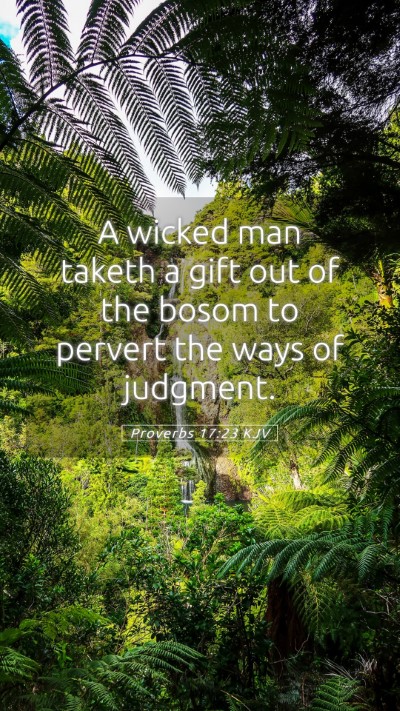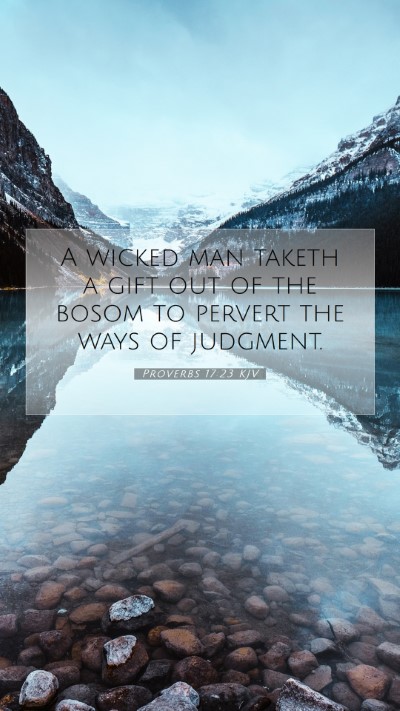Understanding Proverbs 17:23: A Comprehensive Commentary
The verse Proverbs 17:23 states, "A wicked man taketh a gift out of the bosom to pervert the ways of judgment." This insightful scripture warns against the corrupting influence of bribery and its capacity to distort justice.
Meaning of Proverbs 17:23
This verse highlights several critical themes that are relevant not only in its historical context but also in modern life.
- Bribery and Corruption: The “wicked man” symbolizes those who engage in immoral practices to achieve their ends. The idea of taking a gift out of the bosom signifies the clandestine and deceitful nature of bribery, which aims to undermine fairness in society.
- Justice Distortion: The phrase “to pervert the ways of judgment” emphasizes how bribery can lead to manipulation of justice, resulting in unfair outcomes that favor the unjust.
- Moral Integrity: This scripture serves as a call for ethical conduct, as it contrasts the wicked actions of the corrupt with the virtuous character expected from the righteous.
Bible Verse Interpretations
Insights from various commentators provide a deeper understanding:
- Matthew Henry: He emphasizes that those who are corrupt use gifts as tools to compromise justice. Henry advocates the value of integrity in judgments and the dangers posed by the influence of corrupt individuals.
- Albert Barnes: Barnes discusses the broader implications of this verse, noting that the 'gift' represents any form of bribery that seeks to lead the judge astray from impartiality. This shows how morally reprehensible it is to allow personal gain to dictate justice.
- Adam Clarke: Clarke points out that this verse serves as a warning to judges and leaders about the importance of maintaining personal integrity, thereby preserving the dignity of their roles as guardians of justice.
Scripture Analysis
From a scriptural perspective, this verse has significant implications for various domains, including personal conduct, governance, and community ethics. It can be analyzed through the lens of:
- Moral Philosophy: The ethical considerations inherent in the verse link it to a broader discourse on right and wrong in societal contexts.
- Socio-Political Dynamics: The influence of bribery can be examined in the context of today’s governance, where corruption often becomes a barrier to justice.
- Character Disposition: The verse invites introspection about one’s integrity and the lengths one might go to when faced with moral dilemmas.
Application of Proverbs 17:23 in Daily Life
Understanding how to interpret Bible verses for practical living is crucial.
- Personal Integrity: Emphasizing the importance of saying no to bribes and dishonesty in our transactions with others.
- Encouraging Justice: Taking a stand for fairness and truth in all personal and professional engagements.
- Teaching Others: In Bible study groups and families, discussing the significance of moral clarity and justice can help cultivate an environment of trust and integrity.
Bible Study Insights
This verse is a fitting subject for Bible study lessons that explore:
- The Nature of Wickedness: Examining what constitutes wickedness and the social implications of corrupt behavior.
- Justice in the Eyes of God: Analyzing biblical standards for fairness and truth in judgments.
- Responsibility of Leaders: Understanding the burden of moral obligations placed on those in positions of authority.
Related Bible Cross References
This verse connects well with:
- Exodus 23:8: “And thou shalt take no gift: for the gift blindeth the wise, and perverteth the words of the righteous.”
- Proverbs 15:27: “He that is greedy of gain troubleth his own house; but he that hateth gifts shall live.”
- Micah 3:11: “The heads thereof judge for reward, and the priests thereof teach for hire, and the prophets thereof divine for money: yet will they lean upon the Lord, and say, Is not the Lord among us? none evil can come upon us.”
Conclusion
In summary, Proverbs 17:23 serves as a potent reminder of the pernicious effects of corruption in society. The insights gleaned from public domain commentaries illuminate the multifaceted discussion around justice, ethics, and the critical importance of personal integrity. Understanding Scripture in this context allows believers to apply such timeless truths in their lives.


